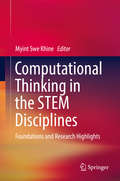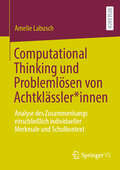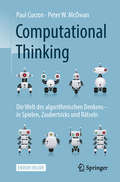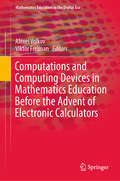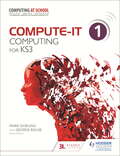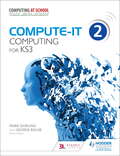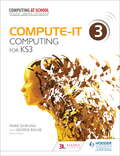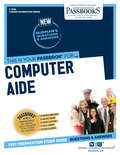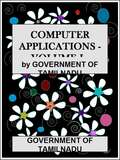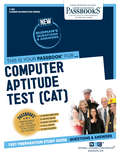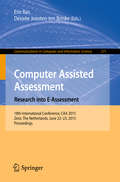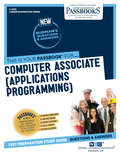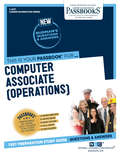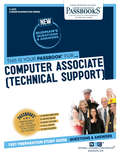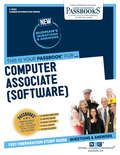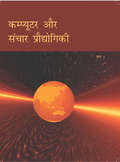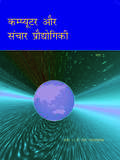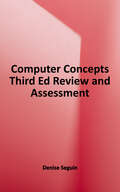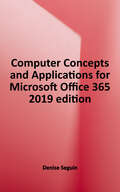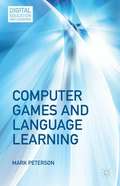- Table View
- List View
Computational Thinking in the STEM Disciplines: Foundations And Research Highlights
by Myint Swe KhineThis book covers studies of computational thinking related to linking, infusing, and embedding computational thinking elements to school curricula, teacher education and STEM related subjects. Presenting the distinguished and exemplary works by educators and researchers in the field highlighting the contemporary trends and issues, creative and unique approaches, innovative methods, frameworks, pedagogies and theoretical and practical aspects in computational thinking. A decade ago the notion of computational thinking was introduced by Jeannette Wing and envisioned that computational thinking will be a fundamental skill that complements to reading, writing and arithmetic for everyone and represents a universally applicable attitude. The computational thinking is considered a thought processes involved in a way of solving problems, designing systems, and understanding human behaviour. Assimilating computational thinking at young age will assist them to enhance problem solving skills, improve logical reasoning, and advance analytical ability - key attributes to succeed in the 21st century. Educators around the world are investing their relentless effort in equipping the young generation with real-world skills ready for the demand and challenges of the future. It is commonly believed that computational thinking will play a pivotal and dominant role in this endeavour. Wide-ranging research on and application of computational thinking in education have been emerged in the last ten years. This book will document attempts to conduct systematic, prodigious and multidisciplinary research in computational thinking and present their findings and accomplishments.
Computational Thinking und Problemlösen von Achtklässler*innen: Analyse des Zusammenhangs einschließlich individueller Merkmale und Schulkontext
by Amelie LabuschComputational Thinking erfährt vor dem Hintergrund des technologischen Fortschrittes und der zunehmenden Automatisierung von Prozessen durch Algorithmen eine steigende Relevanz. Es umfasst ein breites Spektrum an Kompetenzen, die für eine erfolgreiche Teilhabe an der heutigen technisierten Gesellschaft von Bedeutung sind. In dieser Arbeit wird erstmals der Zusammenhang zwischen Kompetenzen im Bereich ‚Computational Thinking‘ und Aspekten des Problemlösens von Achtklässlerinnen und Achtklässlern unter Berücksichtigung individueller Merkmale, wie Geschlecht, soziale Herkunft, Migrationshintergrund und Selbstwirksamkeit im Bereich ,Computational Thinking‘ und des schulischen Kontextes mittels Mehrebenenstrukturgleichungsmodellierung untersucht. Die Datengrundlage bilden Kompetenztests und Fragebögen für Schülerinnen und Schüler sowie Lehrkräfte, wobei sowohl Primär- als auch Sekundäranalysen durchgeführt werden. Die Datenbasis bildet die IEA-Studie ICILS 2018 (International Computer and Information Literacy Study), in der erstmals im Rahmen eines internationalen Zusatzmoduls Ergebnisse zum Kompetenzbereich ‚Computational Thinking‘ von Achtklässlerinnen und Achtklässlern präsentiert wurden.
Computational Thinking: Des Welt des algorithmischen Denkens – in Spielen, Zaubertricks und Rätseln
by Paul Curzon Peter W. McOwan Bernhard GerlIn diesem Buch lernen Sie die Grundzüge und Vorteile des Computational Thinking kennen, also des analytischen, von Algorithmen geprägten Denkens. Die Autoren behandeln dabei unterhaltsam und anwendungsbezogen die Grundelemente dieser Denkweise - darunter Denken in Algorithmen, Zerlegung, Abstraktion und Mustererkennung. Diese Prinzipien werden anschaulich an Hand von Zaubertricks, Spielen und Rätseln, aber auch an echten, anspruchsvollen Problemen erklärt. Sie erkunden dabei auch die Verbindungen zwischen Computational Thinking und wissenschaftlichem, aber auch kreativem Denken - und wie daraus Innovationen entstehen können.Computational Thinking hat die Art und Weise, wie wir alle leben, arbeiten und spielen, verändert. Es hat Auswirkungen darauf, wie Wissenschaft betrieben wird, Kriege gewonnen, ganz neue Industrien geschaffen und Leben gerettet werden. Es ist das Herzstück der Programmierung und ein leistungsfähiger Ansatz zur Problemlösung, mit oder ohne Computer. In einigen Ländern werden bereits Kindern in der Grundschule diese Fertigkeiten beigebracht.Ob Sie also einfach wissen wollen, um was es beim Computational Thinking geht oder ob Sie neue Möglichkeiten finden wollen, auch im Alltag effektiver zu werden, ob Sie (Informatik-)Lehrer oder Schüler sind oder einfach Spaß an Spielen und Rätseln haben – in diesem Buch finden Sie die nötigen Grundlagen.
Computations and Computing Devices in Mathematics Education Before the Advent of Electronic Calculators (Mathematics Education in the Digital Era #11)
by Viktor Freiman Alexei VolkovThis volume traces back the history of interaction between the “computational” or “algorithmic” aspects of elementary mathematics and mathematics education throughout ages. More specifically, the examples of mathematical practices analyzed by the historians of mathematics and mathematics education who authored the chapters in the present collection show that the development (and, in some cases, decline) of counting devices and related computational practices needs to be considered within a particular context to which they arguably belonged, namely, the context of mathematics instruction; in their contributions the authors also explore the role that the instruments played in formation of didactical approaches in various mathematical traditions, stretching from Ancient Mesopotamia to the 20th century Europe and North America.
Compute-IT 1: Computing for KS3
by Mark Dorling George RouseCompute-IT will help you deliver innovative lessons for the new Key Stage 3 Computing curriculum with confidence, using resources and meaningful assessment produced by expert educators. With Compute-IT you will be able to assess and record students' attainment and monitor progression all the way through to Key Stage 4. Developed by members of Computing at School, the national subject association for Computer Science, and a team of Master Teachers who deliver CPD through the Network of Excellence project funded by the Department for Education, Compute-IT provides a cohesive and supportive learning package structured around the key strands of Computing. Creative and flexible in its approach, Compute-IT makes Computing for Key Stage 3 easy to teach, and fun and meaningful to learn, so you can: Follow well-structured and finely paced lessons along a variety of suggested routes through Key Stage 3 Deliver engaging and interesting lessons using a range of files and tutorials provided for a range of different programming languages Ensure progression throughout Key Stage 3 with meaningful tasks underpinned by unparalleled teacher and student support Assess students' work with confidence, using ready-prepared formative and summative tasks that are mapped to meaningful learning outcomes and statements in the new Programme of Study Creative and flexible in its approach, Compute-IT makes Computing for Key Stage 3 easy to teach, and fun and meaningful to learn. This is the first title in the Compute-IT course, which comprises three Student's Books, three Teacher Packs and a range of digital teaching and learning resources delivered through Dynamic Learning.
Compute-IT: Student's Book 1 - Computing for KS3 (Compute-IT)
by Mark Dorling George Rouse Sarah Lawrey Zoe Ross Phil Bagge Graham Hastings Carl Turland Genevieve Smith-Nunes Ilia Avroutine James AbelaCompute-IT will help you deliver innovative lessons for the new Key Stage 3 Computing curriculum with confidence, using resources and meaningful assessment produced by expert educators. With Compute-IT you will be able to assess and record students' attainment and monitor progression all the way through to Key Stage 4. Developed by members of Computing at School, the national subject association for Computer Science, and a team of Master Teachers who deliver CPD through the Network of Excellence project funded by the Department for Education, Compute-IT provides a cohesive and supportive learning package structured around the key strands of Computing. Creative and flexible in its approach, Compute-IT makes Computing for Key Stage 3 easy to teach, and fun and meaningful to learn, so you can:Follow well-structured and finely paced lessons along a variety of suggested routes through Key Stage 3Deliver engaging and interesting lessons using a range of files and tutorials provided for a range of different programming languages Ensure progression throughout Key Stage 3 with meaningful tasks underpinned by unparalleled teacher and student support Assess students' work with confidence, using ready-prepared formative and summative tasks that are mapped to meaningful learning outcomes and statements in the new Programme of StudyCreative and flexible in its approach, Compute-IT makes Computing for Key Stage 3 easy to teach, and fun and meaningful to learn. This is the first title in the Compute-IT course, which comprises three Student's Books, three Teacher Packs and a range of digital teaching and learning resources delivered through Dynamic Learning.
Compute-IT: Student's Book 2 - Computing For Ks3
by Mark Dorling George RouseCompute-IT will help you deliver innovative lessons for the new Key Stage 3 Computing curriculum with confidence, using resources and meaningful assessment produced by expert educators. With Compute-IT you will be able to assess and record students' attainment and monitor progression all the way through to Key Stage 4. Developed by members of Computing at School, the national subject association for Computer Science, and a team of Master Teachers who deliver CPD through the Network of Excellence project funded by the Department for Education, Compute-IT provides a cohesive and supportive learning package structured around the key strands of Computing. Creative and flexible in its approach, Compute-IT makes Computing for Key Stage 3 easy to teach, and fun and meaningful to learn, so you can:Follow well-structured and finely paced lessons along a variety of suggested routes through Key Stage 3Deliver engaging and interesting lessons using a range of files and tutorials provided for a range of different programming languages Ensure progression throughout Key Stage 3 with meaningful tasks underpinned by unparalleled teacher and student support Assess students' work with confidence, using ready-prepared formative and summative tasks that are mapped to meaningful learning outcomes and statements in the new Programme of StudyCreative and flexible in its approach, Compute-IT makes Computing for Key Stage 3 easy to teach, and fun and meaningful to learn. This is the second title in the Compute-IT course, which comprises three Student's Books, three Teacher Packs and a range of digital teaching and learning resources delivered through Dynamic Learning.
Compute-IT: Student's Book 2 - Computing for KS3 (Compute-IT)
by Mark Dorling George RouseCompute-IT will help you deliver innovative lessons for the new Key Stage 3 Computing curriculum with confidence, using resources and meaningful assessment produced by expert educators. With Compute-IT you will be able to assess and record students' attainment and monitor progression all the way through to Key Stage 4. Developed by members of Computing at School, the national subject association for Computer Science, and a team of Master Teachers who deliver CPD through the Network of Excellence project funded by the Department for Education, Compute-IT provides a cohesive and supportive learning package structured around the key strands of Computing. Creative and flexible in its approach, Compute-IT makes Computing for Key Stage 3 easy to teach, and fun and meaningful to learn, so you can:Follow well-structured and finely paced lessons along a variety of suggested routes through Key Stage 3Deliver engaging and interesting lessons using a range of files and tutorials provided for a range of different programming languages Ensure progression throughout Key Stage 3 with meaningful tasks underpinned by unparalleled teacher and student support Assess students' work with confidence, using ready-prepared formative and summative tasks that are mapped to meaningful learning outcomes and statements in the new Programme of StudyCreative and flexible in its approach, Compute-IT makes Computing for Key Stage 3 easy to teach, and fun and meaningful to learn. This is the second title in the Compute-IT course, which comprises three Student's Books, three Teacher Packs and a range of digital teaching and learning resources delivered through Dynamic Learning.
Compute-IT: Student's Book 3 - Computing for KS3
by Mark Dorling George RouseCompute-IT will help you deliver innovative lessons for the new Key Stage 3 Computing curriculum with confidence, using resources and meaningful assessment produced by expert educators. With Compute-IT you will be able to assess and record students' attainment and monitor progression all the way through to Key Stage 4. Developed by members of Computing at School, the national subject association for Computer Science, and a team of Master Teachers who deliver CPD through the Network of Excellence project funded by the Department for Education, Compute-IT provides a cohesive and supportive learning package structured around the key strands of Computing. Creative and flexible in its approach, Compute-IT makes Computing for Key Stage 3 easy to teach, and fun and meaningful to learn, so you can:Follow well-structured and finely paced lessons along a variety of suggested routes through Key Stage 3Deliver engaging and interesting lessons using a range of files and tutorials provided for a range of different programming languages Ensure progression throughout Key Stage 3 with meaningful tasks underpinned by unparalleled teacher and student support Assess students' work with confidence, using ready-prepared formative and summative tasks that are mapped to meaningful learning outcomes and statements in the new Programme of StudyCreative and flexible in its approach, Compute-IT makes Computing for Key Stage 3 easy to teach, and fun and meaningful to learn. This is the third title in the Compute-IT course, which comprises three Student's Books, three Teacher Packs and a range of digital teaching and learning resources delivered through Dynamic Learning.
Compute-IT: Student's Book 3 - Computing for KS3 (Compute-IT)
by Mark Dorling George RouseExam Board: OCR, AQA, Edexcel & WJECLevel: KS3Subject: MathematicsFirst Teaching: September 2015First Exam: June 2016Compute-IT will help you deliver innovative lessons for the new Key Stage 3 Computing curriculum with confidence, using resources and meaningful assessment produced by expert educators. With Compute-IT you will be able to assess and record students' attainment and monitor progression all the way through to Key Stage 4. Developed by members of Computing at School, the national subject association for Computer Science, and a team of Master Teachers who deliver CPD through the Network of Excellence project funded by the Department for Education, Compute-IT provides a cohesive and supportive learning package structured around the key strands of Computing. Creative and flexible in its approach, Compute-IT makes Computing for Key Stage 3 easy to teach, and fun and meaningful to learn, so you can:Follow well-structured and finely paced lessons along a variety of suggested routes through Key Stage 3Deliver engaging and interesting lessons using a range of files and tutorials provided for a range of different programming languages Ensure progression throughout Key Stage 3 with meaningful tasks underpinned by unparalleled teacher and student support Assess students' work with confidence, using ready-prepared formative and summative tasks that are mapped to meaningful learning outcomes and statements in the new Programme of StudyCreative and flexible in its approach, Compute-IT makes Computing for Key Stage 3 easy to teach, and fun and meaningful to learn. This is the third title in the Compute-IT course, which comprises three Student's Books, three Teacher Packs and a range of digital teaching and learning resources delivered through Dynamic Learning.
Computer Aide: Passbooks Study Guide (Career Examination Series)
by National Learning CorporationThe Computer Aide Passbook® prepares you for your test by allowing you to take practice exams in the subjects you need to study. It provides hundreds of questions and answers in the areas that will likely be covered on your upcoming exam, including but not limited to: operating and electronic computer and peripheral equipment attached or communicating with an electronic computer; observing and controlling the operation of computer equipment; clerical abilities; record keeping; understanding and interpreting written material; arithmetic reasoning; and other related areas.
Computer Application Volume 1 class 11 - Tamil Nadu Board
by Government TamilnaduHuman civilization achieved the highest peak with the development of computer known as “Computer era”. Literate are those who have the knowledge in using the computer whereas others are considered illiterate inspite of the other degrees obtained. The growth of the nation at present lies in the hands of the youth, hence the content of this book is prepared in such a way so as to attain utmost knowledge considering the future needs of the youth.
Computer Applications Theory & Practical class 12 - Tamil Nadu Board
by Training State Council of Educational ResearchHuman civilization achieved the highest peak with the development of computer known as “Computer era”. Literate are those who have the knowledge in using the computer whereas others are considered illiterate inspite of the other degrees obtained. The growth of the nation at present lies in the hands of the youth, hence the content of this book is prepared in such a way so as to attain utmost knowledge considering the future needs of the youth.
Computer Applications Volume I class 11 - Tamil Nadu Board - SCERT: கணினி பயன்பாடுகள் - தொகுதி 1 தமிழ்நாடு அரசு மேல்நிலை முதலாம் ஆண்டு
by Government TamilnaduHuman civilization achieved the highest peak with the development of computer known as “Computer era”. Literate are those who have the knowledge in using the computer whereas others are considered illiterate inspite of the other degrees obtained. The growth of the nation at present lies in the hands of the youth, hence the content of this book is prepared in such a way so as to attain utmost knowledge considering the future needs of the youth.
Computer Aptitude Test: Passbooks Study Guide (Career Examination Series)
by National Learning CorporationThe Computer Aptitude Test (CAT) Passbook® prepares you for your test by allowing you to take practice exams in the subjects you need to study. It provides hundreds of questions and answers in the areas that will likely be covered on your upcoming exam.
Computer Assisted Assessment. Research into E-Assessment: 18th International Conference, CAA 2015, Zeist, The Netherlands, June 22–23, 2015. Proceedings (Communications in Computer and Information Science #571)
by Desirée Joosten-ten Brinke Eric RasThisbook constitutes the refereed proceedings of the 18th International Conferenceon Computer Assisted Assessment, CAA 2015, held in Zeist, The Netherlands, inJune 2015. The 15 revised full papers presented were carefully reviewed andselected from numerous submissions. The papers present current developments intechnology-enhanced assessment. Topics covered include: automatic item generation, computeradapted testing, the use of multimedia in assessment, e-assessment policies.
Computer Associate: Passbooks Study Guide (Career Examination Series #C-2473)
by National Learning CorporationThe Computer Associate (Applications Programming) Passbook® prepares you for your test by allowing you to take practice exams in the subjects you need to study. It provides hundreds of questions and answers in the areas that will likely be covered on your upcoming exam, including but not limited to: identification of computer problems and causes; data processing; programming techniques; knowledge of computer terminology; and other related areas.
Computer Associate: Passbooks Study Guide (Career Examination Series #C-2473)
by National Learning CorporationThe Computer Associate (Operations) Passbook® prepares you for your test by allowing you to take practice exams in the subjects you need to study. It provides hundreds of questions and answers in the areas that will likely be covered on your upcoming exam, including but not limited to: data processing concepts; job scheduling; hardware/software utilization including telecommunication systems, problem-solving, reading comprehension; and other related areas.
Computer Associate: Passbooks Study Guide (Career Examination Series #C-2473)
by National Learning CorporationThe Computer Associate (Technical Support) Passbook® prepares you for your test by allowing you to take practice exams in the subjects you need to study. It provides hundreds of questions and answers in the areas that will likely be covered on your upcoming exam, including but not limited to: data processing concepts; program development and documentation; job scheduling; control techniques; problem solving; and more.
Computer Associate: Passbooks Study Guide (Career Examination Series #C-2473)
by National Learning CorporationThe Computer Associate (Software) Passbook® prepares you for your test by allowing you to take practice exams in the subjects you need to study. It provides hundreds of questions and answers in the areas that will likely be covered on your upcoming exam, including but not limited to: identification of computer problems and causes; data processing capabilities and resources; systems and applications programming techniques; database management and other areas related to computer systems; standards of employee conduct; and more.
Computer Aur Sanchaar Prodhogiki Bhag 1 class 11 - NCERT Board: कम्प्यूटर और संचार प्रौद्योगिकी भाग 1 कक्षा 11 - एनसीईआरटी
by Rashtriy Shaikshik Anusandhan Aur Prashikshan Parishadकम्प्यूटर और संचार प्रौद्योगिकी भाग 1 कक्षा 11 वीं का पुस्तक हिंदी भाषा में राष्ट्रीय शैक्षिक अनुसंधान और प्रशिक्षण परिषद् ने प्रकाशित किया गया है । इस पाठ्यपुस्तक में छ: विषय-वस्तुओं/ यूनिटों के अंतर्गत चौदह अध्याय हैं, अर्थात् कम्प्यूटर तथा संचार प्रौद्योगिकी (Computer and Communication Technology - CCT) के संसार में स्वागत; कार्यस्थल उत्पादकता उपकरण संचार अवधारणाएं एवं कुशलताएँ; वेब प्रकाशन प्रौद्योगिकी; सामूहिक कार्य (टीमवर्क) तथा वेब आधारित सहयोग उपकरण और उभरती हुई प्रौद्योगिकियाँ। यह पुस्तक निष्ठापूर्वक तैयार की गई है और पाठ्यपुस्तक विकास समूह, स्कूलों के अध्यापक, विषय विशेषज्ञ, शिक्षाविद् और सरकारी, गैर-सरकारी तथा निजी संस्थाओं / संगठनों के तकनीकी विशेषज्ञ के सतत प्रयासों का परिणाम है । छात्र उच्च माध्यमिक स्तर के बाद भी कम्प्यूटर के बारे में अध्ययन जारी रख सकते हैं और नहीं भी, किंतु ऐसा प्रतीत होता है कि वे सीसीटी के पीछे निहित तर्क को किसी भी अन्य शाखा में उपयोगी पाएँगे, चाहे वह प्रशासन हो, सामाजिक विज्ञान हो, पर्यावरण, अभियांत्रिक (इंजीनियरिंग), प्रौद्योगिकी, जैविकी, चिकित्सा या ज्ञान की कोई भी अन्य शाखा हो ।
Computer Aur Sanchaar Prodhogiki Bhag 2 class 11 - NCERT Board: कम्प्यूटर और संचार प्रौद्योगिकी भाग 2 कक्षा 11 - एनसीईआरटी
by Rashtriy Shaikshik Anusandhan Aur Prashikshan Parishadकम्प्यूटर और संचार प्रौद्योगिकी भाग 2 कक्षा 11 वीं का पुस्तक हिंदी भाषा में राष्ट्रीय शैक्षिक अनुसंधान और प्रशिक्षण परिषद् ने प्रकाशित किया गया है । इस पाठ्यपुस्तक में छ: विषय-वस्तुओं/ यूनिटों के अंतर्गत चौदह अध्याय हैं, अर्थात् कम्प्यूटर तथा संचार प्रौद्योगिकी (Computer and Communication Technology - CCT) के संसार में स्वागत; कार्यस्थल उत्पादकता उपकरण संचार अवधारणाएं एवं कुशलताएँ; वेब प्रकाशन प्रौद्योगिकी; सामूहिक कार्य (टीमवर्क) तथा वेब आधारित सहयोग उपकरण और उभरती हुई प्रौद्योगिकियाँ। यह पुस्तक निष्ठापूर्वक तैयार की गई है और पाठ्यपुस्तक विकास समूह, स्कूलों के अध्यापक, विषय विशेषज्ञ, शिक्षाविद् और सरकारी, गैर-सरकारी तथा निजी संस्थाओं / संगठनों के तकनीकी विशेषज्ञ के सतत प्रयासों का परिणाम है । छात्र उच्च माध्यमिक स्तर के बाद भी कम्प्यूटर के बारे में अध्ययन जारी रख सकते हैं और नहीं भी, किंतु ऐसा प्रतीत होता है कि वे सीसीटी के पीछे निहित तर्क को किसी भी अन्य शाखा में उपयोगी पाएँगे, चाहे वह प्रशासन हो, सामाजिक विज्ञान हो, पर्यावरण, अभियांत्रिक (इंजीनियरिंग), प्रौद्योगिकी, जैविकी, चिकित्सा या ज्ञान की कोई भी अन्य शाखा हो ।
Computer Concepts
by Denise SeguinHighly visual and logically organised, this comprehensive program gives instructors and learners a seamless transition from concepts to applications coverage. <p><P>Students will learn Microsoft Office applications in a way that saves time and makes the best use of the available feature set, while learning the latest computer concepts. This solution has been designed and organized to provide a fresh look at the skills a student should know to be successful in today's world. Seguin's versatile content can be split for concepts-only or applications-only coverage.
Computer Concepts and Applications for Microsoft Office 365
by Denise SeguinHighly visual and logically organised, this comprehensive program gives instructors and learners a seamless transition from concepts to applications coverage. Students will learn Microsoft Office applications in a way that saves time and makes the best use of the available feature set, while learning the latest computer concepts. <p><po>This solution has been designed and organised to provide a fresh look at the skills a student should know to be successful in today's world. Seguin's versatile content can be split for concepts-only or applications-only coverage.
Computer Games And Language Learning
by Mark PetersonA comprehensive and accessible overview for language educators, researchers, and students, this book examines the relationship between technological innovation and development in the field of computer-assisted language learning, exploring relevant theories and providing practical evidence about the use of computer games in language learning.
